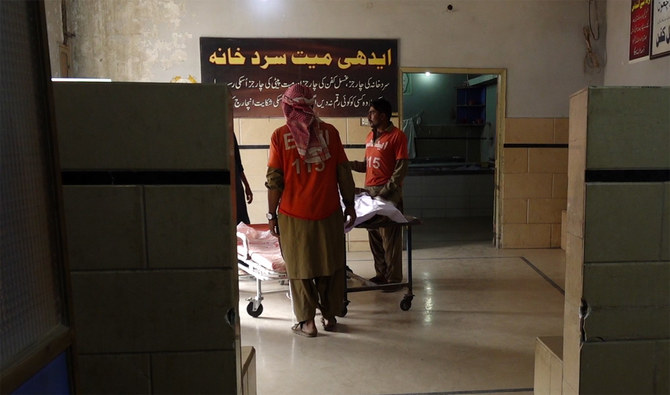KARACHI: As the ambulance arrived at the entrance of a mortuary in Karachi’s Ancholi neighborhood, four attendants jumped into action, quickly pulling a stretcher out of the vehicle and pushing it inside to a window where an official used a biometric scanner to take the fingerprint of the dead man wrapped in a white shroud.
The man’s print will next be sent to be matched against the vast archive of the National Database and Registration Authority (NADRA), a government body that maintains identity records of all citizens of Pakistan.
The initiative, launched in 2016, has helped to identify thousands of bodies that turn up each year at the mortuary run by the Edhi Foundation, a charity that operates the largest network for the burial of unclaimed corpses in Pakistan.
The morgue has received 82,500 unclaimed bodies from when it was set up in 1986 until 2016, or an average of 2,750 bodies per year over the course of three decades. Since the implementation of the NADRA system, this number has gone down to 1,512 annually.
“When the bodies arrive from Karachi, we take biometrics, and they are identified, we send their details [thumb impression] to NADRA to determine their status and on the second day, we receive the status and all details,” said Zulfiqar Ali, an official at the Citizens Police Liaison Committee, which works with the Edhi Foundation.
“The body is then identified, and we provide all information to the family.”
The identities of nearly 80 percent of cases can now be traced, Ali added.
Before the technology, thousands more bodies were buried namelessly at Karachi’s Mochko Graveyard, where most headstones carry numbers instead of names. The tombstone of an unidentified man buried at the cemetery just earlier this week had the simple identifier, 94,600.
“Thousands of unclaimed dead bodies are buried in the graveyard,” Noman Masood, the supervisor of the Edhi Foundation mortuary, told Arab News. “Perhaps their family members are still hanging on the gallows of waiting, hoping that they are still alive and will be found somewhere.”
Muhammad Riaz Baloch, who drives an Edhi ambulance, said unclaimed bodies were discovered throughout the sprawling metropolis of Karachi, Pakistan's largest city, with a population of nearly 18 million by most estimates.
“Some of the deceased have gunshot wounds, while others are drug addicts found in drains, trash, or under a bridge, so we pick them up,” he said, adding that bodies were retrieved by Edhi after an entry was made with the police station that had jurisdiction.
Asked what happened when bodies could not be identified through the NADRA system, Edhi’s Masood said the mortuary used “old practices” for cases where exact matches were not possible due to disfigured fingers or if the deceased was a minor.
In such cases, the body was buried after around eight days, but was first photographed and a record added to a file under the burial number of the deceased.
Edhi kept the photos on file in case relatives showed up searching for them.
“When people come to us looking for their loved ones and find their body, their suffering ends,” Masood said, “and they find some solace even if they find them dead.”












